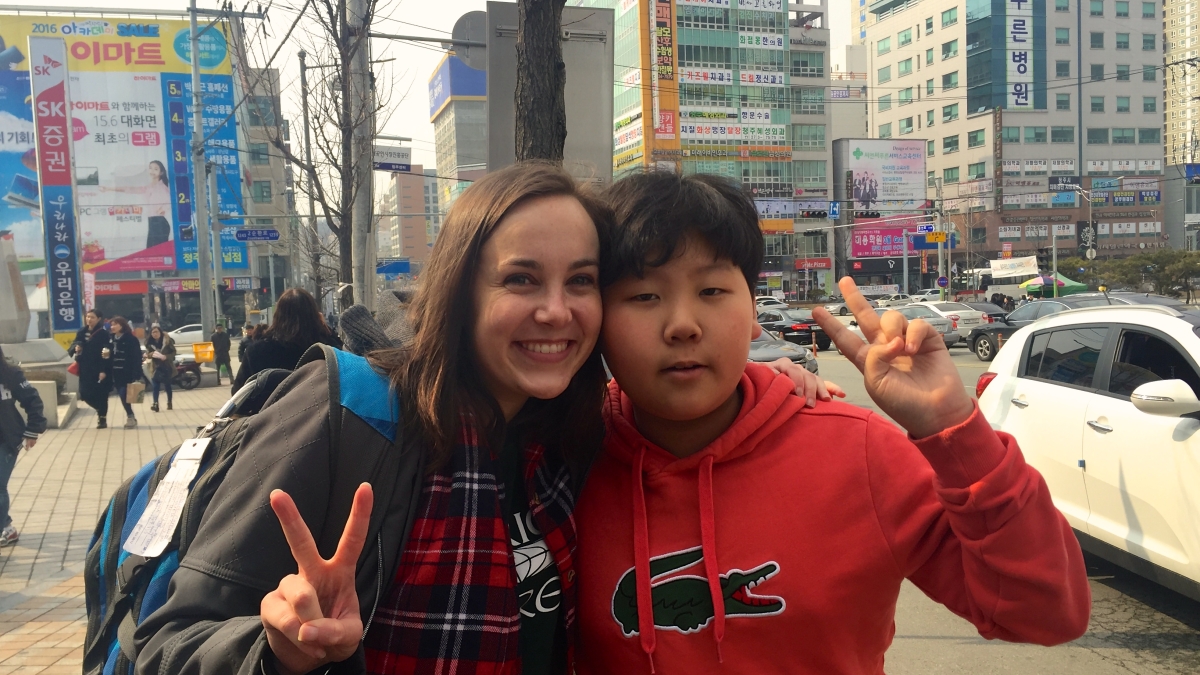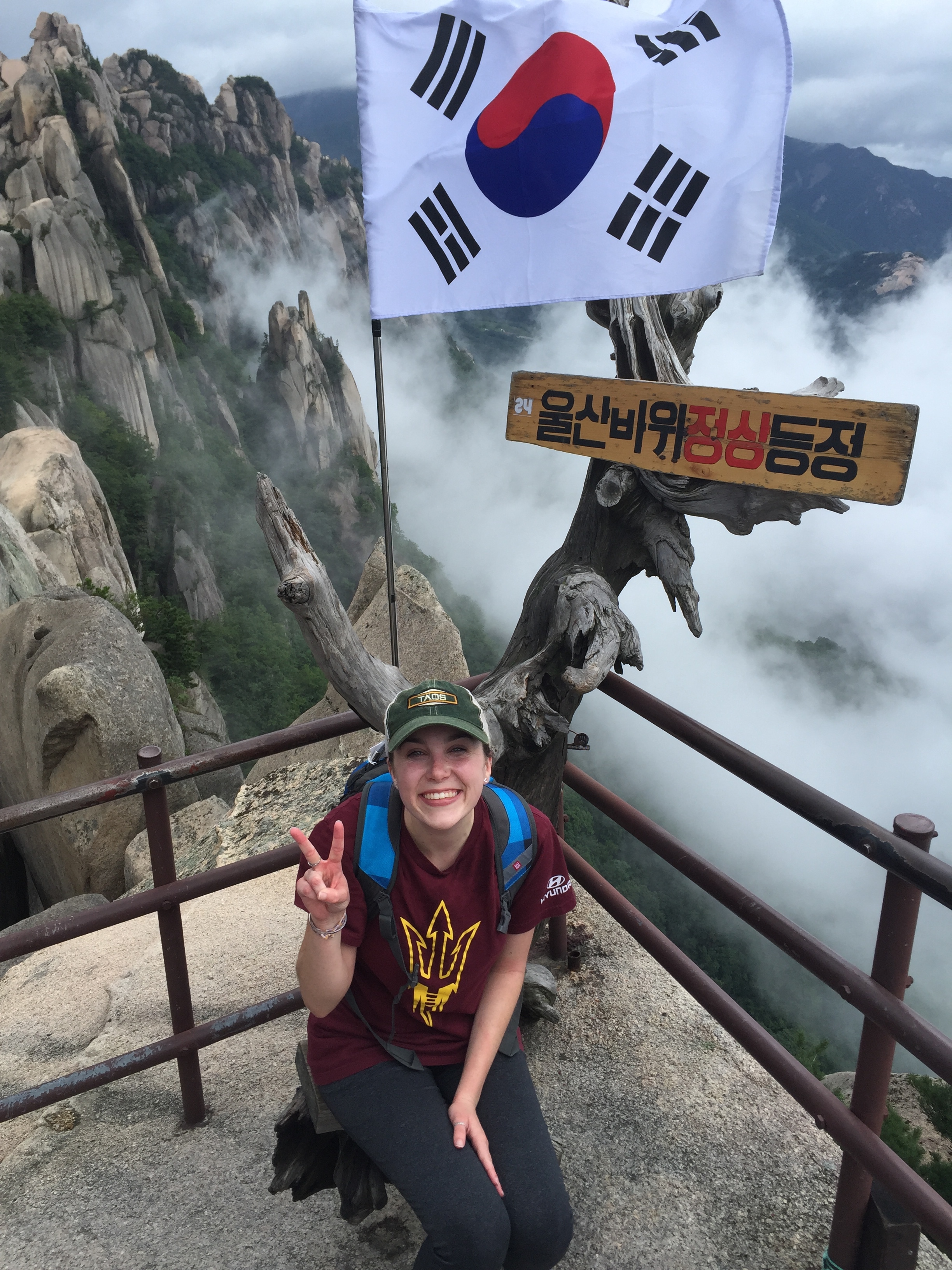Claire Cambron wanted a way to open her mind and her heart before she learns to heal.
Cambron, who is from Phoenix, won a Fulbright scholarship and just returned from spending eight months as an English teaching assistant at Jeungan Elementary School in Cheongiu, South Korea.
“I didn't get the chance to study abroad in college and I really wanted to travel before medical school,” said Cambron, who earned her undergraduate degree last year in biochemistry and genetics from the School of Life Sciences, in ASU's College of Liberal Arts and Sciences.
“I felt that by traveling, I could learn more about a different culture, which would help me be a more open-minded and receptive doctor and person. I also was looking for an opportunity that would push me out of my comfort zone and challenge me.”
Cambron answered a few questions about her Fulbright year:
Question: What was a typical day like for you?
Answer: I lived with a host family. Each morning, my host mom would make me breakfast before I walked across the street to the elementary school. I would teach five classes throughout the day, before spending the rest of the school day lesson planning for the rest of the week. Most of my lesson planning involved making games for the students to practice the skills learned from the textbook. At night, I would eat dinner in my host mom's restaurant downstairs with my host brother. She always cooked the best food.
Q: What did you do on the weekends?
A: On most weekends, I spent time with my host family, especially my 13-year-old host brother Chaung Hyun. On other weekends, I would take the intercity bus to Seoul to meet my friends.
Q: What was the best part of your experience?
A: The best part of my experience was definitely the bond I made with my host family. My host parents didn't speak English and I speak very little Korean, but I was amazed by how easy it was to connect to them. I had four host siblings, who all became my great friends, and one of them had a baby. It was so fun watching the baby grow over my time there.
Q: Were there been any challenges?
A: Overcoming the language barrier was sometimes difficult, as were some cultural differences. At times, it was difficult to collaborate with my co-teachers, who sometimes had different methods of operating the classroom and disciplining our students. However, as we continued to work together, we became better at sharing ideas and learning from one another as well as our students.
Claire Cambron at the top of Seoraksan Mountain.
Q: Did anything funny happened during your adventure?
A: In Korea, they don't eat their grape skins. They squeeze out the inside and toss the exterior. One day at lunch, when I tried to eat my grapes, my co-teacher told me, "Claire, you eat grapes like my baby."
One time at dinner, we were eating apples when my host brother's girlfriend asked me if I have heard of "Piyansay." I asked her if that is a type of Korean fruit. She looked shocked as she shook her head no and proceeded to show me a picture of BEYONCÉ on her phone.
Q: What did you bring back from your experience that will help you in your career — or your life?
A: I think that every person should open their mind to cultures different from their own. As a doctor, I want to be sensitive to my patients' beliefs and priorities in order to best serve their needs. As a teacher, I learned to cater to the varying needs of my students, and as a doctor, I will need to be equally perceptive and adaptable.
Q: What’s next for you?
A: I will be going to medical school. I hope to work as a practicing physician and to also become involved in the academic side of medicine.
Q: What would you tell someone who is contemplating applying for a Fulbright?
A: It's a great opportunity to learn a lot about yourself through travel and service. The relationships you make during your grant year can stay with you for life. Throughout your year abroad, keep an open mind and practice gratitude because it's an amazing experience.
Top photo: Claire Cambron and her 13-year-old host brother, Chaung Hyun.
More Local, national and global affairs

How ASU research is helping first responders
Arizona State University’s faculty members are studying how to improve the jobs, health and well-being of first responders, and also applying their research through direct training to help these…
ASU honors Sun Devils, local organizations with Social Work Month Awards
Arizona State University’s School of Social Work recently honored a total of 29 students, faculty, staff, alumni and local community organizations with its annual Social Work Month Awards.The…

ASU's USAID projects provided economic benefits to US
For more than a decade, Arizona State University has helped people around the world — and advanced interests in the United States at the same time — through its collaborative projects with the U.S.…



